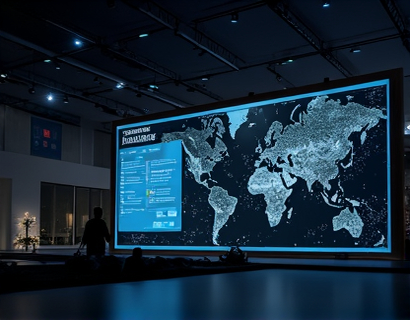Transforming Business Communication and Operations with Advanced Distributed Networking Solutions
In the rapidly evolving landscape of global business, the importance of reliable and efficient networking solutions cannot be overstated. As companies expand their operations across borders, the need for advanced distributed networking solutions becomes paramount. These solutions not only enhance communication but also streamline operations, ensuring that businesses can maintain high performance and connectivity no matter where they operate. This article delves into the transformative impact of cutting-edge distributed network technologies on business communication and operations, highlighting how these innovations can drive organizational success in the global market.
Distributed networking solutions are designed to create a robust and flexible network infrastructure that can adapt to the dynamic needs of modern businesses. Unlike traditional networking setups, which often rely on centralized hubs and can become bottlenecks, distributed networks distribute data and processing tasks across multiple nodes. This approach not only enhances reliability but also improves performance and scalability. For businesses with a global presence, this means that data can be processed and transferred more efficiently, reducing latency and increasing overall operational efficiency.
The core benefit of advanced distributed networking is its ability to ensure seamless data transfer across vast distances. In a global business environment, the speed and reliability of data transmission are critical. Distributed networks achieve this by breaking down data into smaller packets and routing them through multiple paths. This redundancy ensures that even if one path fails, the data can still reach its destination without significant delays. As a result, businesses can maintain real-time communication and data access, which is essential for coordinated operations and timely decision-making.
One of the key challenges in global business operations is managing the complexity of cross-border communications. Distributed networking solutions address this by providing a unified and consistent network experience, regardless of the geographical location. This uniformity simplifies network management and reduces the risk of errors or disruptions. For instance, a company with offices in North America, Europe, and Asia can rely on a single network architecture that performs optimally across all regions. This not only streamlines IT management but also ensures that all departments work in harmony, enhancing overall productivity.
Another significant advantage of distributed networking is its role in enhancing security. In today's digital landscape, cybersecurity threats are a constant concern for businesses. Distributed networks incorporate multiple layers of security, making it more difficult for malicious actors to compromise the network. By distributing data and processing tasks, these networks reduce the risk of a single point of failure. Additionally, advanced encryption and authentication mechanisms can be implemented across the network, providing an additional layer of protection for sensitive business information.
The implementation of distributed networking solutions also leads to substantial cost savings over time. Traditional networking setups often require significant investments in hardware and maintenance, especially as businesses grow and their network demands increase. Distributed networks, on the other hand, are designed to be scalable and cost-effective. By leveraging cloud-based services and virtualization technologies, businesses can reduce the need for physical infrastructure, lowering both capital and operational expenses. This scalability is particularly beneficial for companies that experience rapid growth or fluctuating demand.
Moreover, distributed networking solutions contribute to environmental sustainability. By optimizing data transfer and reducing the need for extensive physical hardware, these networks minimize energy consumption and carbon footprint. This is increasingly important for businesses aiming to adopt more sustainable practices and meet corporate social responsibility goals. A greener network infrastructure not only benefits the environment but also enhances a company's reputation and appeal to environmentally conscious consumers and partners.
The impact of distributed networking on business operations extends beyond technical improvements. It fosters a culture of innovation and agility within organizations. With a robust and reliable network, businesses can quickly adapt to changing market conditions and customer needs. For example, e-commerce platforms can leverage distributed networks to handle peak traffic periods without compromising performance, ensuring a seamless shopping experience for customers. Similarly, financial institutions can process transactions more efficiently, reducing wait times and improving customer satisfaction.
In the realm of remote work and distributed teams, distributed networking plays a crucial role in maintaining productivity and collaboration. With the shift towards remote work, businesses need networks that can support a large number of users accessing resources from various locations. Distributed networks provide the necessary bandwidth and low latency to facilitate smooth communication and file sharing. Tools like video conferencing, collaborative document editing, and real-time project management become more effective and reliable, bridging the gap between remote and in-office work environments.
Furthermore, distributed networking solutions enable better data analytics and insights. With the ability to collect and process data from multiple sources in real-time, businesses can gain valuable insights into customer behavior, market trends, and operational efficiency. This data-driven approach allows companies to make informed decisions, optimize processes, and stay ahead of the competition. For instance, a manufacturing company can use distributed networks to monitor production lines across different facilities, identifying bottlenecks and areas for improvement in real-time.
The integration of advanced distributed networking solutions also supports the growth of Internet of Things (IoT) applications. As more devices become connected to the network, the demand for a scalable and reliable network infrastructure increases. Distributed networks can handle the vast amount of data generated by IoT devices, ensuring that information is transmitted and processed efficiently. This is particularly relevant for industries such as smart cities, industrial automation, and healthcare, where IoT devices play a critical role in enhancing services and operations.
In conclusion, the adoption of advanced distributed networking solutions is a strategic move for businesses looking to enhance their global operations and communication. These solutions offer unparalleled reliability, efficiency, and scalability, addressing the unique challenges of a connected world. By embracing distributed networking, businesses can achieve new levels of connectivity and operational excellence, positioning themselves for success in an increasingly competitive global market.










































